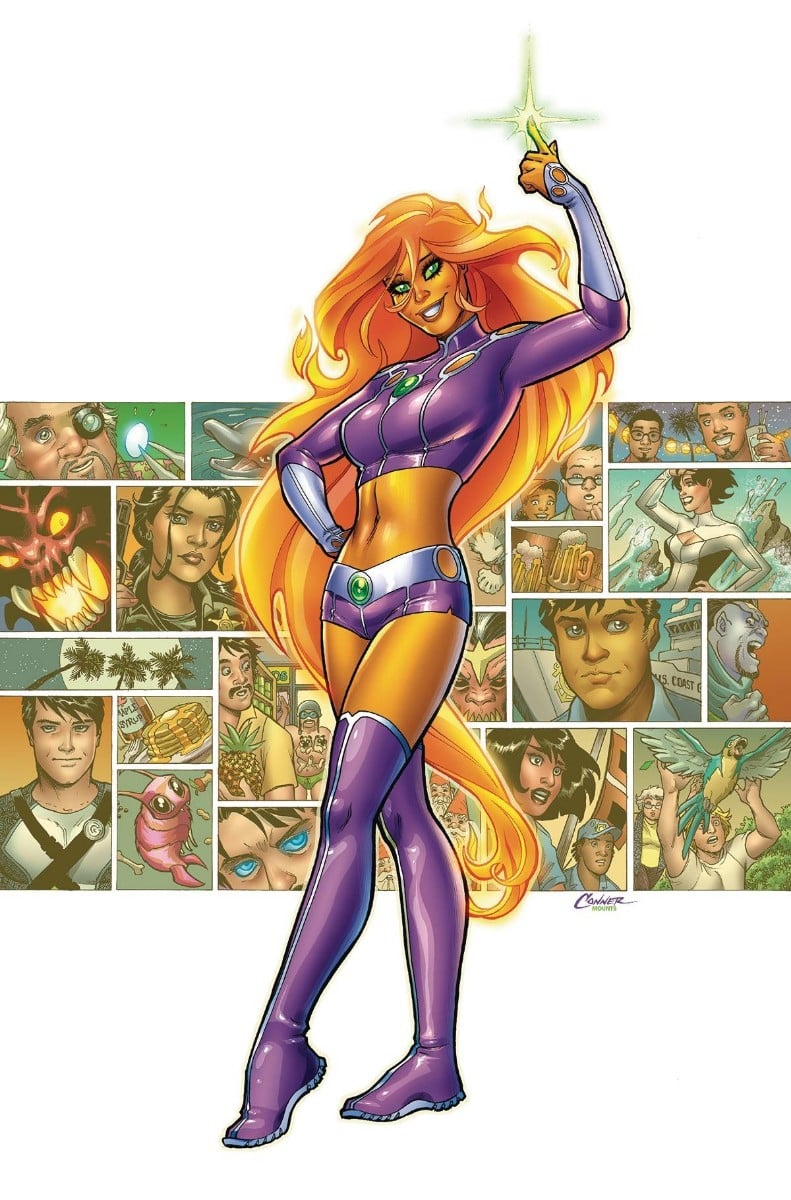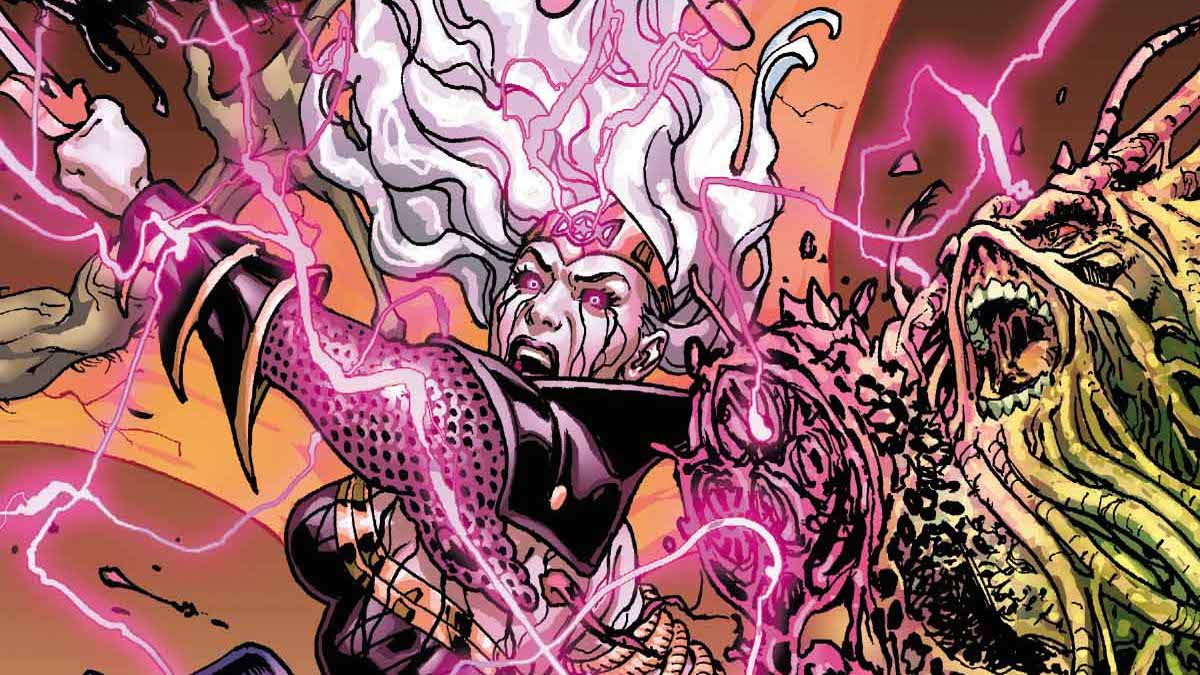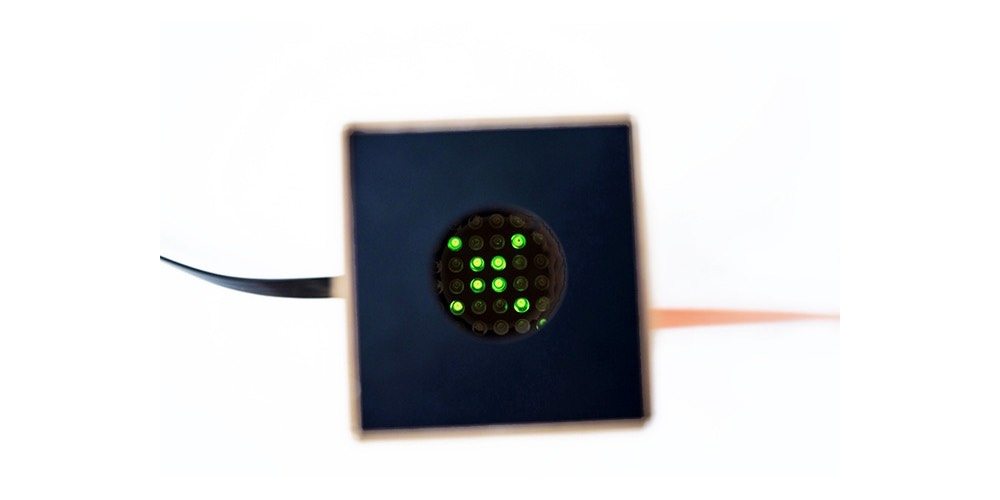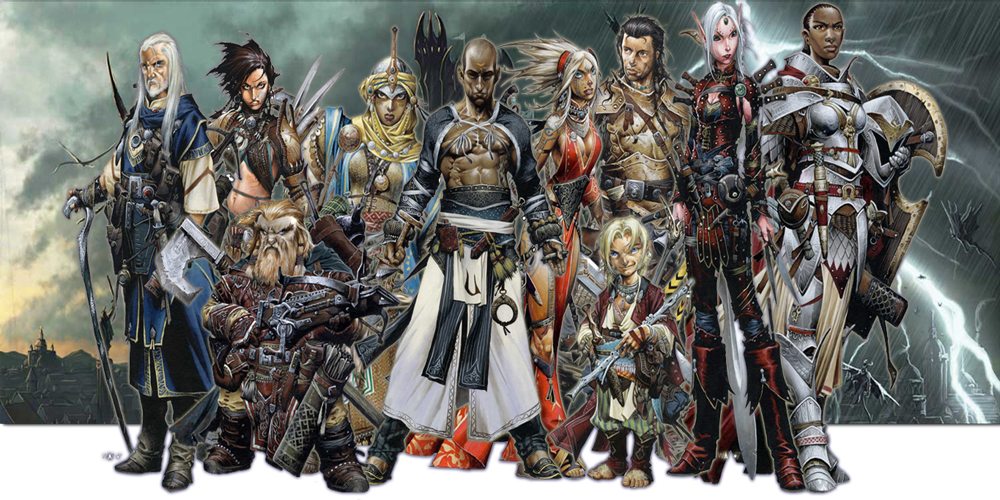If you’ve seen my name in a byline here, it’s almost certainly in conjunction with trades, never single issues. Any interviews I’ve done about single issues have been done with the help of K. Tilden Frost’s collection because I don’t own them. And while The Orville has a comic coming out in July, the only way I’m going to be able to review it issue-by-issue is with her co-writing (and probably taking lead.) By the way I act, you’d think I was allergic to the smell of staple-bound sequential art.
But I’m not. In fact, I used to read single issues all the time. As a kid, I loved reading Sonic the Hedgehog and Silver Age comics from my dad’s collection, once I’d gone through the proper procedures for the latter—ask for the box I wanted (out of about fifty) to be taken down off the shelf, take it to a clean space, wash my hands with soap, take out the comic from its mylar bag with acid-free backing board that was shut with reusable tape, hold the comic in such a way as to not create bends, creases, dog-ears (What monster does dog-ears pages of anything? What went wrong with your life?), or obvious imprints of where your thumb was.
This didn’t actually bother me, though I did have trouble with the tape. I read about the rainbow Batman, the exploits of Lois Lane, even a little bit of Legion—so long as the comics were in Fine condition or less. I think at one point I earned my way up to Very Fine for the cheaper comics, but it was a rare thing for a collector like him to have a Very Fine comic that wasn’t worth something like $80. When he did have copies like that, he only had them because he’d bought a random lot off of eBay to get a particular issue or three, and left the rest in boxes regardless—and that was my reading pile.

Sonic was a lot easier to enjoy. He bought the entire run up until about #100, miniseries and all, and left it for us. He also said he’d never sell them because the memories of my brother and me reading them meant too much for him. I would have kept up, but, eventually, the book decided to go meat-and-potatoes instead of showing some real ambition. Since I had nothing that was particularly ambitious or interesting to read, I fell off of single issues around the age of 13, with the exception of Knights of the Dinner Table. Then a year or two later, someone put a copy of the 1997 Deadpool series in my hand. It was the first Marvel comic I’d ever read and, honestly, if Marvel was more like that, I’d probably be a Marvel fan instead of a guy who likes some Marvel comics. Some of the mental illnesses that Deadpool and I share (PTSD, specifically) were portrayed more respectfully than anything else I can imagine, and I needed that like I needed water. There’s a reason I paid through the nose to get the out of print omnibus.
Anyway.
Until DC’s One Year Later event (post-Infinite Crisis), I stayed out of the comic book store. Partly because the store I used to go to turned out to be a money-laundering operation that shut down after the owner was caught with a van full of more weapons and drugs than your average GTA mission.
So in order to get back into comics, I went to a different store that didn’t have all of its assets seized; unfortunately, it is run so incompetently that it’s a wonder they’re in business. They couldn’t take pre-orders or try to get copies of books they hadn’t stocked correctly if you paid them, literally, because I had money in my hands to buy the issues. It took outside measures to get the first issue of Darkwing Duck so that I had context for the rest of the series. Near the end of my time at the store, I had to do the exact same thing I’d done with the first volume of the series, despite placing a pre-order eight months in advance for the new #1.

But they were the biggest store in the state, and about ten minutes away. Any river looks good if you don’t have any water, I guess. They even managed to cater to kids and women/girls, which is smart because they’re the biggest group of comic readers in the United States. That store pisses me off every time I go there, but I respect them for that.
I tended to stick with DC, tentatively trying Marvel once or twice, but the “House of Ideas” was an impenetrable mess, expecting you to know Marvel continuity back to Fantastic Four #1. So I read and loved titles like Booster Gold, Red Robin, Stephanie Brown’s Batgirl, Power Girl, and Justice Society of America. Every week my dad and I would go to the comic book store and I would come home, stack in hand, and read.
Read Wikipedia, that is. Marvel cares about new readers as little as I care about the 49ers, but DC at least tried, using an occasional editorial footnote or diegetic recap. With that half-effort extended, I could use context clues and the osmosis of knowledge from my enjoyment of the DCAU to look up backstories of characters that were being referenced or introduced like I should know exactly who they are, patching plot holes I’d never heard of, and every other time where it seemed like the writers were sure we’d read this twenty-year-old story and didn’t need any catching up to enjoy. Looking at you, first arc of Booster Gold.

As I continued my research, I’d pass the books to my dad to read throughout the week. Whenever he had questions, I could answer them, and we’d talk about the issue in question. What is Booster Gold doing traveling back in the past to deal with this Deathstroke guy? That’s from an early arc of New Teen Titans. Who is Power Girl? That would be Supergirl from Earth-2, from the Silver Age Crisis on Two Earths stories that the Justice League would have with the Justice Society. “Oh yeah,” he said, grinning as he lost himself in thought. “I remember those. They would have Thanksgiving dinner together.” I explained what happened with Crisis on Infinite Earths in enough detail for Power Girl to make sense (long story short: she doesn’t and that’s a plot point), and he explained that the original Crisis is what made him stop reading comics completely—all his favorite characters went away, replaced by different versions of them that never felt the same. Right around 1985, he was done.
There’s something so sad about the fact that he called Batman Year One the perfect comic book, but never read it until he bought me a copy. The very first trade in my collection. Maybe if he’d stuck it out just a little longer, his knowledge wouldn’t have stopped at 1985, or more realistically the 1970s. Maybe I wouldn’t have needed to learn several decades worth of comics history to bring me up to speed. Maybe we wouldn’t have needed to meet in the middle to start learning things together, instead of spending as much time teaching as we did.

Getting him back into comics like this was one of the best things I’d ever been able to do. For the first time, the communal aspect of comics was something I got to participate in. Comic book forums were so toxic, so full of homophobia and anger and racism and elitism that never, ever seemed to end. If you weren’t already in the know, you weren’t welcome.
We read Peter David’s book on writing comics, we tried to track down some older stuff (The guy who writes the “How To Collect” series tracked down older stuff? Stop the presses!), and generally tried to get into more than our weekly trips for new material.
Sadly, we ran into problems with those weekly trips after a few years. Dan Jurgens left Booster Gold, the trio of Justin Gray, Jimmy Palmiotti, and Amanda Conner left Power Girl, and I think the people behind issues 13 and onward on that book were drunk. It was hard to find certain issues because the store somehow got worse, and crossovers like The Lightning Saga or the sequel to Kingdom Come were impenetrable. Neither of us read or liked Kingdom Come because Alex Ross does the creepiest looking people I have ever seen outside of a horror comic, which made it a nightmare to read Justice League or Justice Society. The fake-out series with Bart Allen in The Flash was one that we loved, but ended with the title character’s brutal and senseless murder despite fake solicits for issues past that point. I think we tried one issue of the new Flash, but it was such a disgusting thing to pull that we stopped caring about any Flashes almost completely.
Unfortunately, DC decided that we were going to care about Flash whether we wanted to or not. We kept persisting at the comic book store, right up until Flashpoint hit in 2011. Every single comic we were reading was canceled. I swear to God, every single one. Final Crisis wasn’t readable as a single issue experience and not even that good in trade, but it led to some interesting stories for a few years. That wasn’t the case with a post-Flashpoint world. The New 52 was a sloppy mess, and for the most part, we gave up. One of the store owners had died, and the guy left in charge was a complete moron who seemed to see customers as intruding on his store. We only ever went back for Knights of the Dinner Table (when they were able to actually read and fulfill our pull list) or when there was a 50 percent off sale. Instead, we ordered collections off of Amazon, CheapGraphicNovels, and bought from local second-hand stores.
People talk about supporting local businesses, but I’m going to tell you right now that a local business is only worth supporting if they’re good at what they’re doing for you. This one isn’t. If it goes out of business (it won’t), the only thing I’ll be sad about is that it will be harder for kids to get ahold of their comics.
But we did enjoy a few of the secondhand stores that we found, and I still go to them now. Our favorite was the one we just called “The Mob Store” because I had been searching for the 26 volume set that collected Will Eisner’s The Spirit. They were out of print—of course—and $50-$60 at cover price. But if you went looking, eventually, it was possible to find them at the $15-$20 range. (Except volumes 12 and 14. If you see a copy of those, grab the damn things. It took me two years to find them and, in the end, they were Christmas presents.) The first time we ever went to the Mob Store, I found something like 13 volumes for $10-$15 apiece, and a bunch of other interesting books at prices that seemed absurd. $30 for an omnibus, and he had 12 of them there? Absolute Editions for $40? Wednesday Comics for $12? I was baffled. I never said a word about how good the prices were, but without prompting, the store owner leaned over the counter and said the following words.
“These retail for 50 bucks apiece, I sell them for 15, and I still make a profit. Figure that out.”
In the parking lot my dad and I agreed that if we figured that out, we were going to get our legs broken and tossed in a river for our trouble. But we did call it the Mob Store from then on, and the owner knew me as The Spirit Kid. I was 25, but that didn’t seem to matter much five years later because he called me that last week.

But during all this time, from One Year Later until I stopped buying singles completely, I looked at my dad’s old comics in their short-boxes. Superman, Batman, World’s Finest, The Flash. Even a few from the Colorado Find, some Dell Four-Colors. Comics that were in Near Mint condition according to the most stringent requirements for CGC grading that he’d used on each item. Comics that he never, ever read—because they were too valuable to take out of the mylar. At some point, I resolved to make sure my dad could read every comic from his childhood that he could, to enjoy stuff from that era that he’d never had a chance to read, to enjoy earlier works like the Golden Age Superman (arguably the best the character has ever been, a power fantasy for the little guy against the rich and corrupt), and allow him to let go of some of the single issues that took up space.
When I actually convinced him to buy an omnibus of the Silver Age Flash’s adventures, he called me a servant of Satan. I think it might be the only time I’d out-debated him rather than changed his mind over a few weeks. Normally I didn’t care about winning, just having the conversation. But winning this one meant getting to see him happy, and share it with him. That wasn’t the argument I used. You could only appeal to his emotion sideways through the logic of it being a better format, of him never having had the chance to read The Flash in full (he only ever bought it when he had extra money after the Batman and Superman titles), and to get to the point where he could read the famous The Flash of Two Worlds—he had a statue of the cover, and when he saw an homage to the cover on the CW show he called me downstairs and texted his friend to share it.
The plan was working well. DC’s omnibus line, which included the Golden and Silver Age comics of yesteryear, was looking like a real hit. The newspaper comics he’d never known about were great: he loved hearing me read the German characters from Superman’s Sunday strips because the accent made him laugh as much as the comics. He’d even been getting into newer comics (for a given definition of new) like Kevin Smith’s Green Arrow or the works of George Perez. He was even going to read my Crisis on Infinite Earths Absolute Edition, and we were working on getting a hold of JLA/Avengers. (The oversized, de facto Absolute Edition that went for a stupid amount of money. Part of his eBay collecting had gotten him issues 1, 2, and 4, so we resolved to spend our money on that rather than an inferior format.)
After being a die-hard DC fan for almost fifty years, I think I could have eventually convinced him to start reading Marvel if given the chance. But I wasn’t into Marvel enough at the time to try, so we kept looking for single issues we liked, now with more moderation than our earlier excursions. Harley Quinn/Power Girl and Harley’s Little Black Book were the big ones, along with Starfire, which holds a special place in my heart as being the last… well.
See, I don’t think I’ll ever read Harley’s Little Black Book to completion. Neal Adams is an artist that my dad loved, but he was so slow to finish an issue of Harley’s Little Black Book that they had to do rewrites to accommodate him. It agitated my dad, who wanted to read it so very badly. Neal Adams combined with the people who worked on Power Girl? I don’t think he could have asked for more. They did release the issue, some eight months after it was originally solicited. It’s a real shame because it’s not only late, it looks just awful. But that’s not what bothers me about it. It’s that my dad died before the issue was published.
I don’t recommend staying in a room when someone pulls the plug.
Anyway.

Starfire #12 is the last comic he ever read. I went to AwesomeCon 2019, which is halfway across the country. I couldn’t bring boxes upon boxes of trades on the convention floor and was carefully trying to figure out what exactly I could pack. I brought the two trades collecting the series. It made sense. They’re what I’ll keep to re-read the series. And when they’re on my shelves and when my eyes pass across them, like they do when I turn my head just a bit to look across the desk, I’ll remember talking about not just the issue but the series as a whole, whether it could have continued (it could have), whether it should have continued (it should have), and whether it was as good as Power Girl (our gold standard for comics—we never found anything that topped it).
After he died, I stopped going to my local store almost completely, even for Knights of the Dinner Table. They refused to let my brother use the family discount card—only children of the cardholder could use it, so when it had to go to my name, he wasn’t eligible. It felt like profiting off of a dead man, and I had no time for that. I found the subscription service for Knights of the Dinner Table, and only stopped by when they had pseudo-clearance sales after conventions.

At one point the owner, having not seen me in years, approached me at the counter during check-out. He said he was sorry about my dad, and gave me an extra discount on the Bone Artist’s Edition I’d found in the clearance section. I think I got it for about 20 bucks. I still get a little dazed whenever people talk about my dad dying, and what kind of person he was. In those moments I almost forget that he’d died at all, like it was a strange story to tell him when I got back. Of course, when I go down to his old office, there’s nothing but an empty chair.
I still talk to that chair sometimes.
I fight so very hard not to think “We should go to the Mob Store.” I have to force it, like a track switch at the last moment, to say “I want to go to the Mob Store.” It’s bitter and ugly, like bile in my throat. Just recently, I told the owner of the Mob Store about my dad’s passing. He looked stricken and called him a good, nice man, offering sympathy as best as someone who described himself as obnoxious really can. And I really believed him.
By the time that he died, I’d amassed a collection of over 400 trade paperbacks. That number has doubled in the last three years. A number of newspaper comics made their way in, a result of Don Rosa’s Captain Kentucky and Floyd Gottfredson’s Mickey Mouse leading me down a rabbit hole. It’s during this period of that I started hearing about my absolute least favorite thing from creators: pre-orders.
I understand the ecosystem of comics. Pre-orders are what determine a book’s success, and I encourage people to do it for the sake of the stories they love. But as a reader, it’s always felt like an unfair burden. I’m being asked to put my faith in something without knowing anything except, perhaps, name recognition of the characters or creators. When there was another person reading with me, that was fine. I was okay putting down three to five dollars a month for something I was going to buy again because I was getting a shared experience. The time spent, the conversation and debate, reading—even complaining about the store.
I don’t—I can’t—have that same experience anymore. I’ll read a 25 issue series I found at a used bookstore in an afternoon and talk about the entirety of it, devour a trade the day that it’s delivered, or go through some issue that meant a lot to me because it’s easy to pick off the shelf.
But the chair I’m talking to about it is empty. I will never go down the stairs and hear the familiar sounds of the wheels whirring as the chair was pulled out and spun towards me. The very, very subtle creak as the chair tilted back far enough that I thought it would tip over. I will never see a neutral and focused face move to a pleasant smile when I start asking questions and start answering his. His favorite cat doesn’t even sleep on it anymore, so I don’t (or can’t) have that startling experience I had during the first few months, where the cat would leap onto the chair hard enough to make it spin and for a moment, the sound would remind me that I was supposed to tell him something about what I’d been reading.
I can’t tell if losing that moment is a kindness or a cruelty. But in the end, it was just a moment. A fraction of a fraction of a fraction of what reading comics in single issue form actually was for me.
After he died I wondered, once, whether he had been indulging me by going to the comic stores. My mom shook her head. She said that it was one of his favorite things to do with me and that he loved that we got to share it together.
I love my own collection. Everything about the trades is a pleasure for me, from the contents, the bonus features, the way that they look, to the way that I get to share them with others. Every book I own is something that I have a sincere affection for, one way or another. It’s the kind of thing I wanted my dad to have, and slowly, he was getting there. The Silver Age Flash Omnibus volume 1 is on my shelf now, the one that I had him buy in my role as a servant of Satan. It has a different trade dress than DC’s other Golden/Silver/Bronze Age books, with Carmine Infantino’s famous Showcase #4 as the cover instead. That cover is the moment the Silver Age was born. His Christmas present, an Absolute Edition of Kevin Smith’s Green Arrow, is on the same shelf—with a head-sketch of Green Arrow by Phil Hester from a convention, signed to Joel and Mathias at my request. I think my dad would have been happy with that.

Since he died, I’ve become part of a family with Kay and two wonderful little girls. I wish he could have met them, though he certainly heard about them secondhand and liked them. If I’d known then what I know now, listening to the girls talk to me and each other about the mystery of the Gold Ranger in Power Rangers Zeo, I would never have wondered if he was indulging me. It would be like wondering if he loved me.




